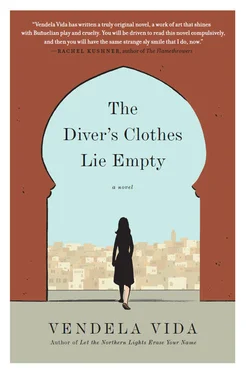The tattooed man has ignored your “What?” and has been speaking Arabic with the wardrobe woman and the makeup woman. Today the makeup woman has a David Bowie — like triangle of eye shadow around her right eye.
When the tattooed man is finished talking with the Elizabethan and David Bowie, he returns his attention to you and your question. He explains that the shots that are filmed from very far away — the scenes that are used to show Maria stuck in traffic — will in fact be the scenes with you in the car. You will be wearing the wig and a scarf around your face, so it’s easy enough for them to do a profile shot of you from a distance, sitting in the car.
You pause and agree — you have no choice but to agree — but ask why they don’t just use the famous American actress for those shots.
“It’s important that she not get exhausted and we have reports that she is getting exhausted.”
“Of course,” you say. You don’t offer that one way for her to conserve energy might be to refrain from drinking gin and tonics until one in the morning. You don’t offer that you yourself are exhausted because of her.
The tattooed man and the makeup woman are discussing specifics. They are studying your skin. The wardrobe woman takes a scarf and wraps it around your face. She’s demonstrating how much of your face will be covered.
The tattooed man wants to make sure that even if you’re shot from a distance, your acne scars will not show. You imagine he’s telling the Elizabethan and David Bowie how terrible it would be if viewers thought that the famous American actress had your skin. The three of them stare at you. You’re at a loss; you force a smile. Apparently, you’re not applying the foundation you bought at the Casablanca beauty store correctly.
The makeup woman gets out her apron with all her brushes, but instead of tying it around her waist, she places it on your lap as though to suggest it’s your weight to bear. She spends a good twenty-five minutes layering foundation on your skin. You are turned away from the mirror, which is a good thing. You are afraid of the craterlike quality your skin will take on when she is done. For a moment you feel like contacting the man at the Casablanca beauty store. If only you had saved his card. He could help this woman do her job.
When your face has been slathered in foundation and powders, the wardrobe woman takes a scarf and wraps it around your head. Unsatisfied with the result, she removes it and wraps it once more. The three of them, the Elizabethan, David Bowie, and the tattooed man, discuss your appearance while only occasionally glancing at you. Then phones are removed and photos are taken.
“This is so we can make sure the scarf falls the same way on her,” the tattooed man says.
You don’t need to ask who her is. You know that he means the famous American actress.
The tattooed man escorts you through real Casablanca traffic, until you turn the corner and arrive at the traffic that’s been manufactured for the film. Of course the trailers couldn’t be on this street — they would be too conspicuous in the shots. Filming has not yet commenced and so the sidewalks are still open to the public. The pedestrians yell at the parked cars, and in particular, at one extra who, for some reason — perhaps he’s getting into character — won’t stop honking.
It’s still morning but you can feel the heat of the day seething up through the cement. This day is hotter than the preceding ones. The old cars are diesel, the smell of their exhaust potent.
The tattooed man walks you to a white car in the middle of all the others. You slide inside the backseat, and greet the driver, who, you know from the situation that has arisen with the producers, cannot drive. The tattooed man closes the door. You note the old car has ashtrays, and that it’s without seat belts. The upholstery on the backseat bench is leather, cracked. You run your fingers over the ocher stuffing that’s trying to emerge.
There’s a speaker in the car through which the director is talking. He speaks for five minutes in Arabic, and then translates for you with one sentence: “We start filming in two minutes.”
In twenty minutes an announcement comes through the speaker saying the filming is commencing. You sit up tall, looking forward intently. Maria is supposed to be growing increasingly frustrated with the traffic. Your driver has been instructed to honk, joining in on the cacophony being created by the other cars around yours. The horns of old cars sound cartoonish, like horns on bumper cars at an amusement park.
Despite the incessant honking, as you sit in the backseat of a period car in a constructed traffic jam in the heart of Casablanca, you begin to feel something that approximates joy. The film will come out, and though no one will know that you were in the backseat of this car, that you are the one whose scarfed profiled appears in the distance, you will know. You will have existed. You will have proof that you were here.
You are picturing yourself at seventy, looking back on your youth. You will remember that you were young once, that you were thirty-three. You were in a movie in Casablanca. Now that you are on the cusp of being a full-fledged adult, as you now see adulthood, your youth has been documented. Your youth will not be defined by the events of the last several months.
An announcement comes on the speaker and the honking ceases. Twenty minutes later, filming commences again. The cars honk, you sit up straight and look forward intently.
Two hours pass, during which filming occurs five more times. The wardrobe woman comes to the car to rearrange your scarf. She consults the photo on her phone.
You sit for another hour, two hours, three. You try not to think of anything at all.
Then, almost too soon, the famous American actress is escorted under an enormous silver umbrella — the sun is hot — toward the car. The door is opened and you greet her hello. You switch places with her. She slides onto the leather red bench of the backseat.
“Ouch,” she says. “The seat is cracked.”
You head to the food trailer (they can’t have the food outside today, due to the traffic, and the pedestrians who might graze). You eat licorice, olives, cheese, crackers, and slices of salami. The salami here is larger, but cut thinner, like ham. You wait to see if you are needed again.
You are needed one more time, when the actress’s makeup needs to be reapplied. The temperature in the car is rising as the day progresses and her mascara is clumping, her lipstick fading as her lips grow increasingly chapped. You return to the car.
“Hello,” you say to the driver.
He grunts in return.
The director approaches.
The director asks you to help him block the scene in which Maria exits the vehicle — that’s his word, “vehicle”—in a storm of rage so they can get the cameras set up right. You are to open the door, slam it, and walk through the traffic.
You do this three times.
Then the famous American actress returns to the car, her forehead dabbed, her lipstick reapplied and outlined with a red makeup pencil.
It’s her turn.
You walk through the fake traffic and back to the food trailer. Even you, who knows better, can’t seem to forget the traffic isn’t real. You signal to every driver to stop, to not drive; with your hands and your eyes you implore them to not run you over.
You spend the remainder of the day waiting. You eat more olives, more licorice. You chew on mints to cleanse your breath (you’re too impatient to slowly let them dissolve in your mouth). Your services might be needed at any minute, you tell yourself. But you are not needed for the rest of the day.
The sadness of being unuseful, which is a particular type of sadness, begins to vine through your body. By 7 P.M. you are wondering if you can take off your wig, scratch your scalp. You have already consumed too many rolls; you were instructed to not eat the sauce-laden dishes offered at the dinner buffet in case you spilled on your outfit, your scarf.
Читать дальше












